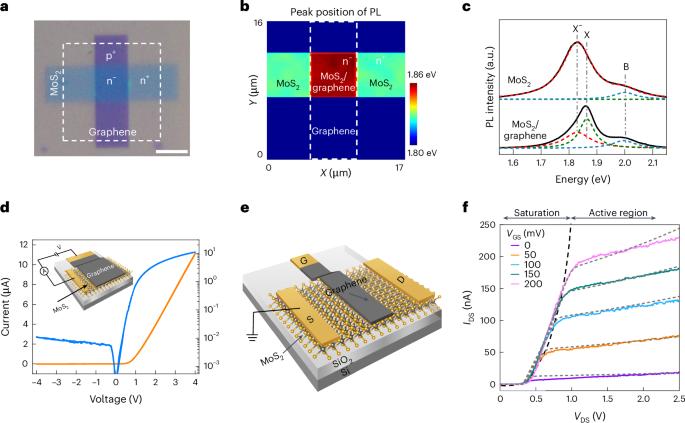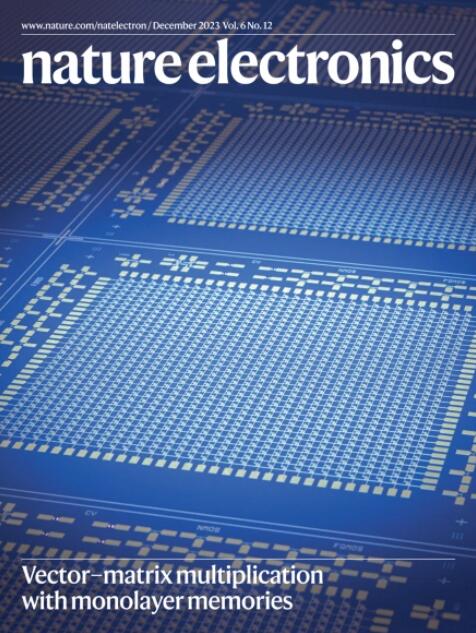A van der Waals interfacial junction transistor for reconfigurable fuzzy logic hardware
IF 33.7
1区 工程技术
Q1 ENGINEERING, ELECTRICAL & ELECTRONIC
引用次数: 0
Abstract
Edge devices face challenges when implementing deep neural networks due to constraints on their computational resources and power consumption. Fuzzy logic systems can potentially provide more efficient edge implementations due to their compactness and capacity to manage uncertain data. However, their hardware realization remains difficult, primarily because implementing reconfigurable membership function generators using conventional technologies requires high circuit complexity and power consumption. Here we report a multigate van der Waals interfacial junction transistor based on a molybdenum disulfide/graphene heterostructure that can generate tunable Gaussian-like and π-shaped membership functions. By integrating these generators with peripheral circuits, we create a reconfigurable fuzzy controller hardware capable of nonlinear system control. This fuzzy logic system can also be integrated with a few-layer convolution neural network to form a fuzzy neural network with enhanced performance in image segmentation. An interfacial junction transistor based on a molybdenum disulfide/graphene heterostructure can generate tunable π-shaped and Gaussian-like membership functions, allowing membership function generators for fuzzy logic systems to be implemented with low device count and energy cost.


用于可重构模糊逻辑硬件的范德华界面结晶体管
由于计算资源和功耗的限制,边缘设备在实施深度神经网络时面临挑战。模糊逻辑系统因其紧凑性和管理不确定数据的能力,有可能提供更高效的边缘实现。然而,它们的硬件实现仍然很困难,主要是因为使用传统技术实现可重构的成员函数发生器需要很高的电路复杂性和功耗。在此,我们报告了一种基于二硫化钼/石墨烯异质结构的多导范德华界面结晶体管,它可以生成可调的类高斯和π形成员函数。通过将这些生成器与外围电路集成,我们创建了一个可重构的模糊控制器硬件,能够进行非线性系统控制。这个模糊逻辑系统还可以与几层卷积神经网络集成,形成一个模糊神经网络,从而提高图像分割的性能。
本文章由计算机程序翻译,如有差异,请以英文原文为准。
求助全文
约1分钟内获得全文
求助全文
来源期刊

Nature Electronics
Engineering-Electrical and Electronic Engineering
CiteScore
47.50
自引率
2.30%
发文量
159
期刊介绍:
Nature Electronics is a comprehensive journal that publishes both fundamental and applied research in the field of electronics. It encompasses a wide range of topics, including the study of new phenomena and devices, the design and construction of electronic circuits, and the practical applications of electronics. In addition, the journal explores the commercial and industrial aspects of electronics research.
The primary focus of Nature Electronics is on the development of technology and its potential impact on society. The journal incorporates the contributions of scientists, engineers, and industry professionals, offering a platform for their research findings. Moreover, Nature Electronics provides insightful commentary, thorough reviews, and analysis of the key issues that shape the field, as well as the technologies that are reshaping society.
Like all journals within the prestigious Nature brand, Nature Electronics upholds the highest standards of quality. It maintains a dedicated team of professional editors and follows a fair and rigorous peer-review process. The journal also ensures impeccable copy-editing and production, enabling swift publication. Additionally, Nature Electronics prides itself on its editorial independence, ensuring unbiased and impartial reporting.
In summary, Nature Electronics is a leading journal that publishes cutting-edge research in electronics. With its multidisciplinary approach and commitment to excellence, the journal serves as a valuable resource for scientists, engineers, and industry professionals seeking to stay at the forefront of advancements in the field.
 求助内容:
求助内容: 应助结果提醒方式:
应助结果提醒方式:


